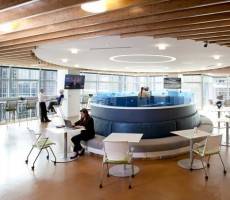September 29, 2014
European airlines now free to allow use of electronic devices during flights
 One of the few remaining refuges from the gaze of the unblinking digital eye is now under threat following news that the European Aviation Safety Agency (EASA) has concluded electronic devices do not pose a safety risk so can be left on during flights. Airlines are now free to permit the use of devices during flights. In an announcement EASA has confirmed that, although each airline would have to go through its own safety checks and an assessment process, they are now free to establish their own policies based on its new guidelines. Of course there remain technical barriers, not least the lack of a signal six miles up, but experience tells us that technology – like nature – always finds a way. The only remaining hope for those passengers who don’t want to be connected themselves or share a confined space with others who are, is cultural. British Airways already allows browsing and texting in wi-fi enabled business class flights, but prohibit voice calls because they understand from surveys how objectionable they are to other passengers.
One of the few remaining refuges from the gaze of the unblinking digital eye is now under threat following news that the European Aviation Safety Agency (EASA) has concluded electronic devices do not pose a safety risk so can be left on during flights. Airlines are now free to permit the use of devices during flights. In an announcement EASA has confirmed that, although each airline would have to go through its own safety checks and an assessment process, they are now free to establish their own policies based on its new guidelines. Of course there remain technical barriers, not least the lack of a signal six miles up, but experience tells us that technology – like nature – always finds a way. The only remaining hope for those passengers who don’t want to be connected themselves or share a confined space with others who are, is cultural. British Airways already allows browsing and texting in wi-fi enabled business class flights, but prohibit voice calls because they understand from surveys how objectionable they are to other passengers.



























September 25, 2014
Why a more flexible approach to where and when we work is long overdue
by Sara Bean • Comment, Facilities management, Flexible working, News